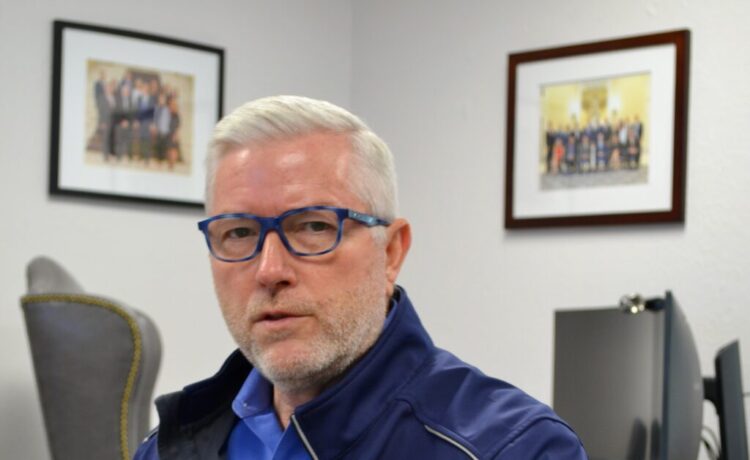Former Oklahoma Department of Corrections Director Steven Harpe is pictured in his office on Aug. 28, 2023. (Photo by Carmen Forman/Oklahoma Voice)
Former Oklahoma Department of Corrections Director Steven Harpe approved a million-dollar deal with a private vendor in early April to install AI call monitoring software in seven state prisons.
Months later, he resigned from state service and took a job with that company.
On Oct. 3, Harpe posted on LinkedIn that he had accepted the position of chief product officer at LEO Technologies, an Austin, Texas-based artificial intelligence company that caters to law enforcement and corrections officials. More than 80 people, including two Board of Corrections members, responded to the post wishing Harpe congratulations. Harpe also shared news of the job change on Facebook.
Six months earlier, on April 3, Harpe authorized a one-year, $1.017 million deal with LEO Technologies. Agency officials gave final approval to the contract, which includes four one-year renewal options, on April 8. The contract stipulates that LeoTech will “assign designated personnel to support Oklahoma DOC operations.”
Harpe announced his resignation in late August, effective Sept. 30. The announcement stated that he was leaving state service to rejoin the private sector but did not specify which company. Typically, if the company is in business with the state, such a move would require a one-year cooling off period.
Oklahoma statutes stipulate that a state officer or employee who exercises discretion or decision-making authority in awarding a privatization contract is prohibited from becoming an employee of that business or organization within one year of the contract award date. Penalties for violating the statute include the cancellation of contracts and a temporary prohibition on doing business with the state.
The Legislature passed the law in 1999 to stop a revolving door of state officials leaving to work for private vendors. In 2009, lawmakers updated the statute to include sanctions for businesses that hire an involved state employee.
Lee Ann Bruce Boone, executive director of the Oklahoma Ethics Commission, said enforcement of the statute likely falls with the attorney general’s office. Leslie Berger, a spokesperson for the attorney general’s office, declined to comment on whether the matter is under investigation, citing an internal agency policy.
Abegail Cave, director of communications for Gov. Kevin Stitt, said people within the governor’s office were unaware of Harpe’s employment plans upon leaving state service. She declined to comment on the law requiring a cooling off period. Harpe was the second Department of Corrections director appointed by Stitt following a 2019 law change that transferred power to appoint the agency’s director from the Board of Corrections to the governor’s office.
Bob Burke, an Oklahoma City-based attorney and historian, said Harpe’s signature on the contract should concern taxpayers.
“It’s a sad day in this state when directors of agencies even recommend the award of a contract and months later go to work for that same company,” Burke said. “The appearance stinks. That kind of self-dealing should be frowned upon by the people and by the governor and legislative leaders who appoint members to the Board of Corrections.”
Harpe did not respond to phone calls, a text message or an email seeking comment. LEO Technologies did not respond to a phone call or written inquiry.
Harpe, who worked as the chief information officer for Gov. Kevin Stitt’s Gateway Mortgage Group prior to entering state government in 2019, regularly promoted the Department of Corrections’ artificial intelligence initiatives in media interviews and at out-of-state conferences.
In July, he traveled to Washington, D.C., to represent the American Correctional Association at a congressional briefing on AI in public safety. At the hearing, Harpe touted broad AI implementation efforts within the Department of Corrections.
“What if I was able to take that labor and instead of using people to do it, I was using facial recognition AI, not just one time, but use it all the time,” Harpe said during the briefing. “I always know where they are. You get logistics of who’s talking to who. Technology now exists where you can look at a body in real time and tell if they’re carrying something, if you have something stowed somewhere on you. It also lets us do really cool things like suicide prevention.”
Harpe earned $275,000 per year in his role as agency director, comparable to top prison officials in larger states like Texas. Stitt has defended the salary as necessary to recruit and retain the best and brightest from the private sector to work in state government.
This article first appeared on Oklahoma Watch and is republished here under a Creative Commons Attribution-NoDerivatives 4.0 International License.





